- PhD Studies
- Planning your PhD
- Eligibility and Application
- German or English Medium
- Financials
- Living as a Student
- Working in Germany
- Get Guidance
- Know more
Planning your PhD
Starting your doctoral studies is a big step in your academic life. Along with identifying your research area you also have to plan where and in which institute you want to pursue your PhD.
Where does research take place in Germany?
Contemplating pursuing a PhD in Germany? There are a number of universities, research institutions and business houses that will welcome you. So getting an insight into the research landscape of the country is of paramount importance!
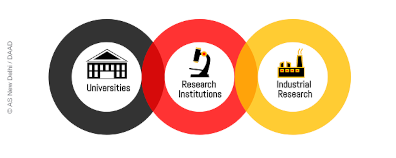
DAAD India
Research is extensively carried out by and through universities, research organisations and the industry. These three are famously known as the three pillars of research in Germany.
You can take a closer look at this on Research in Germany.
Are there different types of PhD in Germany?
If you have set your mind on a PhD in Germany, you can consider two approaches: the traditional approach i.e. individual doctorate and the structured doctoral programmes.
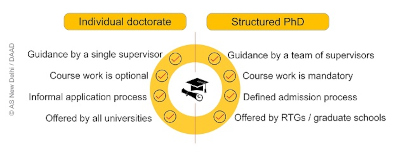
DAAD India
Individual doctoral studies involve identifying a supervisor (Doktorvater/ Doktormutter) at a German university who is willing to guide your research. This system offers a lot of freedom, and calls for a great deal of personal initiative right from identifying a topic in your research field. This kind of doctorate takes about 3-5 years to complete.
Structured PhD programmes are internationally oriented, conducted largely in English and are comparable to PhD programmes offered in English-speaking countries. Here supervision is carried out by several university teachers. These programmes lead to a PhD in about three years.
Which universities should I look at for PhD?
There are various kinds of institutions of higher education in Germany. A majority of these belong to either of the following categories:
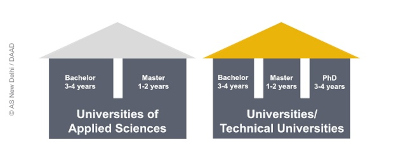
DAAD India
Out of these, Universities and Universities of Technology (TU), are research-oriented and offer a wide variety of subjects. These are the only establishments that can award a PhD degree.
In case you are carrying out your PhD at a research organisation/ University of Applied Sciences, it will always be through a partner university/TU that you will get your degree. Therefore it is important that you fulfill the eligibility criteria of the university/TU as well.
Before you finalise a university or a research institution make sure to check out their websites to know what kind of research is already going on there.
Which is the best university in Germany?
There is no “best university”, neither in one subject and certainly not across all subjects.
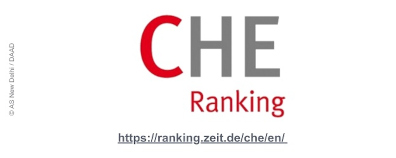
DAAD India CHE Ranking
Germany offers a multidimensional ranking, considering various criteria that are important from a student’s perspective. For example, student and staff judgments on quality of teaching, atmosphere at the university, library and other equipment, student numbers, average study duration, number of graduations, third party funding etc. This way you get a detailed picture of the strengths and weaknesses of each university on university-ranking.de. Here you can find your programme by selecting a subject, a university or even a city in Germany!
As a researcher you should also take the research rankings into consideration. The criteria for such rankings could be research infrastructure, citations, patents, publications and student reviews, to name a few.
What if I want to do a part of my PhD research in Germany?
It is certainly possible to do just a part ofyour doctoral research in Germany under the guidance of a German academician.
The DAAD offers a number of scholarships to support this:
- Bi-nationally Supervised Doctoral Degrees / Cotutelle which is also famously known as DAAD Sandwich Scholarship lets you complete your PhD in two countries. The first country being your home country where you are registered as a doctoral student and the second country is but naturally Germany.
- Research Grants in Germany programme allows you to spend 2 to 12 months in Germany pursuing your research. There is no possibility of extension. You are supervised at your home university as well as at the host institute in Germany. Your doctoral degree is awarded by the home institution.
You are supervised at your home university as well as at the host institute in Germany. Your doctoral degree is awarded by the home institution.
Eligibility and Application
While generally as a Master degree holder you will have ticked off the first major requirement, it is always a good idea to check if the university’s requirements and your qualifications match. And then you can start with the application procedure.
Am I eligible to apply for a PhD?
In Germany, every university is autonomous. This means that every university/ study programme has its own set of criteria for admitting students. So please check the university website, and specifically the programme you are interested in. Here you will find the exact admission requirements.
However, some generalisation is possible. As a Master degree holder from Bangladesh, Bhutan, India, Nepal or Sri Lanka your degree is treated at par with a German Master degree. In some cases, further assessment of eligibility will be required. Do clarify the matter of eligibility with the university or the research organisation of your choice before you send in your application.
Some universities may ask for the proof of your English language proficiency in form of TOEFL or IELTS scores. Some universities may ask for good German language skills depending upon subject of your research. In such cases, your knowledge of German needs to be certified through examinations like the TestDaF or DSH.
How do I go about applying for a PhD?
- Step 1
Decide in which field you want to pursue your research and shortlist potential universities and professors/structured doctoral programme.
A good place to start for an excellent overview of the German research scenario is www.research-in-germany.org. The following databases will bring you a step closer to your research destination:- PhD Germany – A portal where German universities advertise openings for doctoral positions
- An interactive database of Graduate Schools at German universities
- Research Training Groups coordinated by the German Research Foundation (DFG)
- International Max Planck Research Schools (IMPRS)Academicians from your country who have collaborations with German academicians or your seniors who might be carrying out research in Germany can be a great source of information too!
- Step 2
- Traditional Approach
- Contact and convince a supervisor. Make sure that you approach a potential supervisor the right way and in good time – a brief and well-structured communication with an overview of your research proposal and relevant information about yourself is more likely to get you the right kind of response than a simple email stating that you are interested in doing a PhD!
- Communicate information about your background, academic performance and academic goals.
- Get a letter of acceptance from your supervisor.
- Structured doctoral programme
- Identify a programme. Contact the selected university. This will be your most important source of information as far as exact details about eligibility, programme structure, fee, application procedure etc. are concerned.
- Check the application deadline for the programme chosen!
- Application forms and other relevant material can be downloaded from the respective university website.
- Send the application packet.
- Get a confirmation of admission.
- Traditional Approach
- Step 3
- The Admission procedures vary for different universities and for different programmes.
- Check about these with the university of your choice or your supervisor.
- Make sure you have a valid passport!
- Step 4
- Apply for a student visa as soon as you have the admission letter, as the procedure can take 8 to 12 weeks. The German Embassy and the Consulates require proof of funding for the first year of studies. At this stage make sure if you need to get the APS certificate (www.aps-india.de) that some universities/host professors may insist upon. To find out where you should apply for a visa, visit the website of the Germany Embassy in your country.
- Apply for a place in a hostel. In some cases the International Office (Akademisches Auslandsamt) of the university will help you.
- Step 5
- Arrive in Germany at least a week before your course begins.
- Contact the International Office (Akademisches Auslandsamt) of your university for guidance.
- Step 6
Get your residence permit within the first three months of your stay in Germany from the Foreigners’ Registration Office (Ausländeramt).
German or English Medium
Germany offers education in German as well as in English. This applies to PhD too.
Can I do my PhD completely in English medium?
Germany offers close to international programmes with English as the sole or primary medium of instruction. These programmes are called International Programmes.
Few of these programmes may require students to have learnt/learn some German language during their PhD.
Will I need to know German at all if I do my PhD in Germany?
As you have already seen, Germany offers numerous PhD programmes with English as the sole or primary medium of instruction and the language for your thesis. However, some universities/ subject fields such as humanities and law may expect you to have German language proficiency for your PhD. Do find out about this carefully from the course coordinator or your guide.
Also, as a student in Germany, your life will not be limited to the university campus. You will surely want to interact with people, travel through the country-side and make the best of your time there. This is where knowledge of German will present a great advantage!
Universities offer beginner and well as advanced level courses where you can learn German. You can also start learning the language while you are still in your home country at a Goethe-Institut (Max Mueller Bhavan) / Goethe-Zentrum.
Do I require to learn German for DAAD scholarship?
To apply for the DAAD PhD scholarship knowledge of the German language is not mandatory.
The DAAD offers you the possibility or support to complete a German language course. This will help you with your life Germany.
Financials
While in a foreign country being able to manage your finances on your own is very important. You would need to plan your budget by keeping your living expenses, travel costs and tuition fees if any in mind.
What kind of budget should I have in my mind?
Fees: As a PhD scholar in Germany, you are exempted from tuition fees. You will need to pay a semester contribution of around Euro 300, depending upon the university and the services or benefits provided.
Living costs: Apart from the tuition fees, if any, you will require about EUR 992 per month for subsistence i.e. housing, food, clothing, study material and other expenses such as health insurance and leisure activities. The precise split up for this amount will be updated soon.
The amounts can vary from city to city, and of course from lifestyle to lifestyle!
The following table shows the split up.
| Rent and utilities | EUR 332 |
| Food and Drink | EUR 154 |
| Clothing | EUR 48 |
| Learning Materials | EUR 24 |
| Car and Public Transportation | EUR 116 |
| Health Insurance, Medical Costs, Medicine | EUR 96 |
| Telephone, Internet, TV | EUR 32 |
| Recreation, Culture, Sports | EUR 66 |
| Total | EUR 867 |
Source: German Student Union (Deutsches Studentenwerk), 2019
How can I manage my finances as a PhD scholar?
If you are participating in a structured doctoral programme and doing your doctorate at a graduate school, research centre or research training group, the issue of funding is usually resolved with you either working as a research assistant or receiving a scholarship of about EUR 1,300 per month.
If you are pursuing your doctorate on the basis of the traditional approach, you can apply for a job as a research assistant, if there is vacancy.
Working as a research/doctoral assistant involves collaboration in research/teaching and doing administrative work in addition to completing the dissertation. Non-university research institutions like Fraunhofer Institutes and also some companies offer doctoral candidates employment and / or fund their doctoral dissertations.
The DAAD offers the most extensive scholarship programme. Also a number of foundations support international candidates approved for the doctoral process. A database of scholarships offered by various German organisations can be found at www.funding-guide.de.
What is a DAAD PhD scholarship like and how can I apply for it?
If you want to do your full PhD in Germany, DAAD Research Grants – Doctoral Degree in Germany is the programme for you. The application deadline is in October every year. This is for scholarship starting from October of the following year. If you are a well-motivated researcher with high-calibre this research grant supports your complete doctoral studies in Germany. In general the duration of your PhD should not exceed more than four years.
Here is a step-by-step guideline for your application process:
- Step 1
- Collect general information about the DAAD PhD scholarship.
- Thoroughly check the eligibility criteria.
- Attend information sessions or internet-based seminars (webinars) organised by the DAAD.
- Step 2
- Once you have the letter of acceptance from your supervisor/admission letter from your university, complete the application procedure as specified in the scholarship announcement.
- The application deadline typically falls in the month of October the current year for a PhD beginning in the next year.
- Step 3
- Shortlisted applicants from India will be invited for a personal interview around January-February. For Bangladesh, Bhutan, Nepal and Sri Lanka the procedure will be announced closer to the date of interviews.
- The final decision will be announced for applicants from Bangladesh, Bhutan, India, Nepal and Sri Lanka around mid or end of April of the following year.
- Step 4
Once selected, you will have to attend a German language course of your choice, which is a necessary and important part of your scholarship. - Step 5
After the successful completion of your language course in Germany, your PhD will begin in October.
If you have already registered for PhD in your home country and would like to carry out a part of the research in Germany, you may consider applying for Bi-nationally Supervised Doctoral Degrees / Cotutelle scholarship of the DAAD.
An independent selection committee consisting of specialist scientists reviews your applications, wherein your academic qualification, quality of your research project is checked along with your career prospects, motivation and extra curricular activities including your civic engagement.
Can I work in Germany as a student?
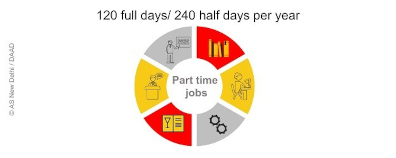
As an international student, you are permitted to work for 140 full days or 280 half days in a year. This will help you in getting a bit of extra pocket-money!
Living as a Student
Living on your own comes with lots of responsibilities, at the same time it can also be very interesting. It starts with finding a place to stay, learning how to cook, shopping on a budget, making friends and connections. Hope this section helps you with some of your questions.
How do I find accommodation?
Germany offers various types of accommodations:
- Students hall of residence: Here you can rent rooms provided by Student Services Organisation (Studentenwerk). They are low in cost and preferred by many students. Studentenwerk also provides specially designed Service Kits for international students. Get in touch with Studentenwerk of your city know more.
- Shared Flats (Wohngemeinschaft – WG): Shared flat or WG is another affordable accommodation, where you have your own room in a flat and share the kitchen and the bathroom with other flatmates. Living in a shared flat is cheaper as the rent and other expenses get shared. You can find advertisements for vacancies in WGs online on social media groups or on student-friendly websites.
- Private apartments: If you prefer living alone, private apartments can be an option for you. You can find them with the help of Studentenwerk, on boards in the university foyer or even on social media groups and websites for rental real estate.
Make sure to be on the lookout from early on, so that you find the best place at an affordable price.
How do I connect with other students?
Connecting with other students can help you to learn from their experience. It may also help you get acquainted with the lifestyle, once you are in Germany.
- Get in touch with DAAD Young Ambassadors. They have studied or carried out their research in Germany. Contact them with your questions, they will be happy to guide you!
- You can also find out about various student associations and groups formed by students of your country/ region.
- You can contact students on various socials media platforms as well. There are groups based on nationalities or interests and activities.
- Many universities arrange introductory events. Ask the international office of your university about them. Research institutions too generally run such initiatives.
Working in Germany
You can of course work in Germany as long as you follow the regulations, which are not complex and are easy to understand.
Can I work in Germany after my studies?
After completing your degree in Germany, you can choose from amongst a wide range of options:

DAAD India
You can stay on in the country for up to 1.5 years to look for a job that is in keeping with your education. Once you find a job, the residence permit issued to you for the purpose of studying, can be converted into a residence permit for taking gainful employment.
Germany has always had a very strong industry-academia linkage. A lot of scientific research is funded by the industry as well. During your studies you can get the opportunity to do internships with German companies, which can open new vistas for your professional career.
In Germany, a doctorate is a prerequisite for a career in research or higher education. Your options include:
- Teaching/Research Assistantships
- Postdoc Positions
- Research Positions in Industry
The portal www.academics.com has Germany’s biggest online job market for researchers.
There are also scholarships for Postdocs offered by the Alexander-von-Humboldt Foundation and other organizations.
Get Guidance
Whether you are in India, Nepal or Bhutan, the DAAD is there to help you with your study in Germany plans. Check out how you can reach us!
Individual Appointments
You can connect with the DAAD office in Colombo or meet Team DAAD online!
Information Sessions
The DAAD offers free of cost information session about studying in Germany regularly. Check which dates and topics suit you, register and join!
Click here for dates, timings and registration links: www.daad-sri-lanka.org/events.
PhD Proposal Writing Workshop
Take a look at the DAAD’s guidelines for writing research proposal
PhD Proposal Writing Workshop
Wondering how to write a PhD proposal? The DAAD offers PhD Proposal Writing Workshop on various topics for aspirants who intend to pursue their doctorate in Germany!
Know more
- Did you find the information about doctoral studies in Germany useful? Keep the digital PhD brochure with you, so that it is all handy!
- You will also find the digital brochure Research Proposal Guidelines 2023 useful.
- There is comfort and certainty in numbers. With the fact sheet Germany India 2022 you can check out actual number of Indian students, what fields they are opting for and which universities they have preferred.